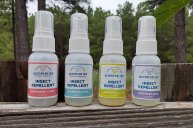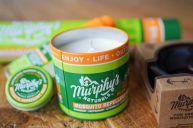Nothing ruins being outdoors more than getting eaten alive by bloodsucking mosquitoes, ticks, fleas, and other bugs. Aside from itchy and painful bites, illnesses from these infected insects have nearly tripled in 13 years from 2004 to 2016, the Centers for Disease Control and Prevention (CDC) reported.
So, if you haven't stocked up on bug repellents this year, now is definitely the time to do so!
While many bug sprays are available to protect you from getting bitten, most have an unpleasant scent and can leave you feeling sticky and uncomfortable during your outdoor adventures. Additionally, many include the active ingredient DEET. While the chemical is effective at repelling mosquitoes and the EPA states it doesn't pose a serious toxicity risk, DEET can cause bad skin irritation, especially if you use it for extended periods, Jeb Owen, PhD, associate professor in the Department of Entomology at Washington State University, told Wide Open Spaces.
Instead, the best home remedies and natural mosquito repellents will be both effective at keeping biting bugs away and gentle on your skin for all-day use when heading out camping, hiking, fishing, hunting, or just hanging out in the backyard.
Protect yourself and your family from insect-borne diseases such as Zika virus, West Nile virus, dengue virus, and Lyme disease—not to mention the annoyance of being covered in bites, head to toe—with these natural mosquito repellents.
READ MORE: The Top 10 States With the Worst Mosquitoes in the U.S.
What DIY Remedies Naturally Keep Mosquitoes Away?
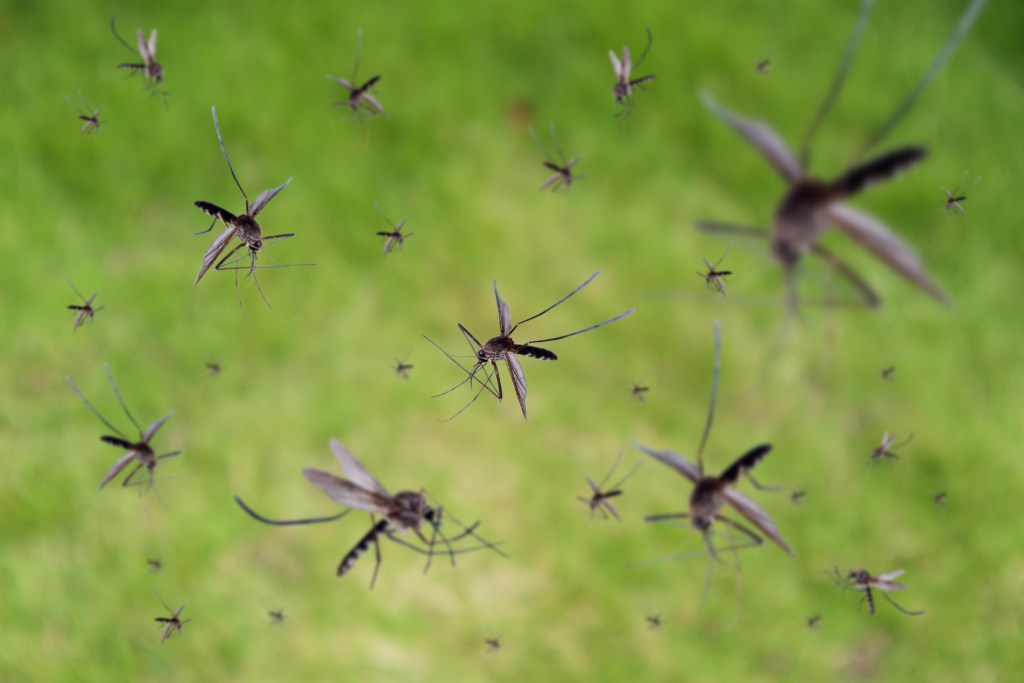
Getty Images, Kwangmoozaa
Certain foods, seasonings, and oils not only have uses in the kitchen but also can be used as DIY remedies for natural pest protection.
1. Essential Oils
When it comes to fighting off creepy crawlers and fliers such as mosquitoes, gnats, and ticks, well-known essential oils including lemon eucalyptus, cinnamon, thyme, soybean, Greek catmint, and tea tree can be effective in keeping them away, Sally Paulson, PhD, associate professor of veterinary and medical entomology at Virginia Tech, told Wide Open Spaces.
In fact, one study from 2014 showed that a mixture containing 32% lemon eucalyptus oil provided more than 95% protection against mosquitoes for nearly three hours.
READ MORE: How To Kill Ticks, According to Experts
2. Fresh Herbs
"Lemongrass, peppermint, rosemary, basil, and lavender all naturally repel mosquitoes. Planting these near your deck or around your yard can reduce a mosquito population," Anthony Szema, MD, a clinical professor of medicine, occupational medicine, epidemiology and prevention at Donald and Barbara Zucker School of Medicine at Hofstra/Northwell, told Wide Open Spaces. Mosquitoes also hate the smell of cedarwood, citronella (often found in outdoor candles), and clove, he adds.
3. Catnip
Planting catnip in your garden is good for more than just a happy cat. Scientists from Iowa State University also found in a study that catnip can be 10 times more effective at repelling mosquitoes than DEET.
Technically, this counts under the fresh herbs category: Catnip is actually a member of the mint family!
How to Use Them
If you're not much of a gardener, you can also mix these essential oils and ingredients from these plants with water to create a natural spray or bug repellent, Dr. Szema says.
If you're dealing with fresh plants, you can chop it up, simmer it in a saucepan with water for 10 minutes, remove it from the heat and allow it to cool for an hour, Dr. Szema said. Once it's cool, he recommends straining the liquid to remove the chunks and pouring about 4 tablespoons of the liquid into a small spray bottle, adding water to the bottle if necessary. You can then apply a small amount to a patch of skin on your arm or leg to make sure you don't have a reaction to the spray.
One user tip: "When using the spray, be careful to avoid your face. You can also use the spray on surfaces, such as tables or window sills, to deter ants and flies," Dr. Szema said.
Can You Use Wild Plants In a Pinch?

Getty Images, beorm
If you don't have access to any natural ingredients or bug repellents at a camping site or hiking trail, you should not use random plants around you as an alternative, both our experts say. While the plants mentioned above can be effective natural bug repellents, they should be distilled into a liquid before being applied, as directed above.
"I do not advise people to go out in nature and in a pinch start pulling plants and rubbing them on yourself," Owen said. Doing this can be dangerous and can lead to allergic reactions or even plant poisoning.
Instead, you should wear loose-fitting, long-sleeved shirts and pants, and avoid wearing perfumes, lotions, and black clothing, as these are all attractants, Paulson said.
The Best Natural Bug Repellents You Can Buy
If you don't feel like making your own DIY version, you can use any of several natural mosquito repellents on the market. However, Paulson notes that just because a repellent is natural doesn't necessarily mean it won't irritate the skin, so definitely avoid any oils you know you're sensitive to and consider testing the product on a small patch of skin first.
A few notes on effectiveness and safety: Lemon eucalyptus is the only plant-based active ingredient recommended by the CDC for mosquito bites. Of course, it's important to buy products only from reputable brands and sources. One way to do that is to use the EPA's online tool to find an EPA-registered repellent. Paulson also advises people to read and follow the application directions for each bug repellent, which can typically be found on the back label of the product.
Aunt Fannie's Mosquito Spray with Essential Oils
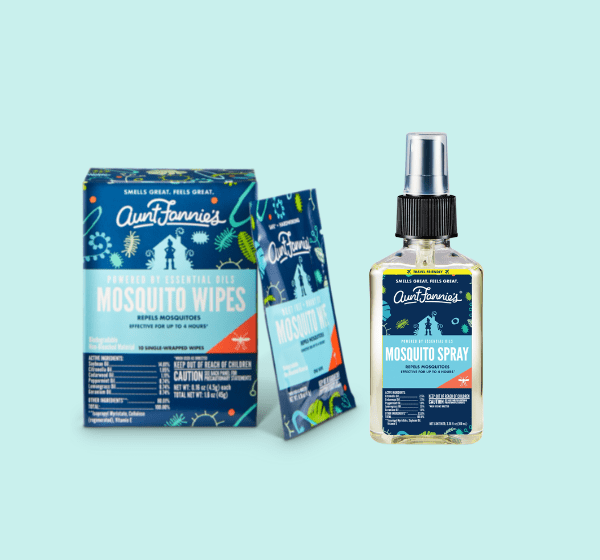
Aunt Fannie's
This DEET-free mosquito spray contains essential oils and natural ingredients such as citronella, lemongrass, peppermint, and cedarwood that can be sprayed and gently rubbed into the skin. It may leave the skin feeling a tad bit oily at first, but it's worth it to keep away mosquito bites. The spray provides up to four hours of protection and is safe for even the youngest members of the family (six months-plus). Aunt Fannie's also comes in various sizes, including a travel size that is small enough to fit in your fanny pack or purse.
Murphy's Naturals Insect Repellent Spray
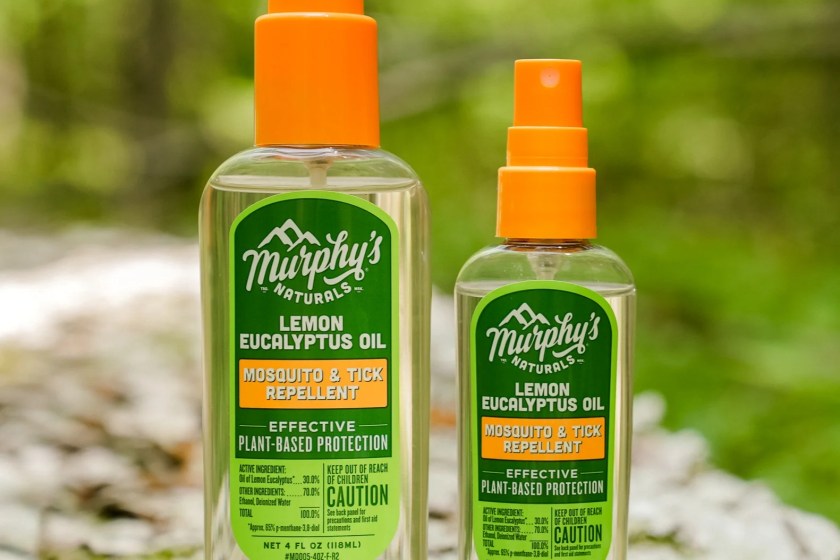
Murphy's Naturals
Wherever you go on your next adventure, this insect repellent spray from Murphy's Naturals will fight off pesky mosquitoes for up to six hours, so you can fully enjoy your time outdoors. It also provides up to four hours of protection against ticks. This multi-use repellent contains 30% oil of lemon eucalyptus (again, the only EPA-approved plant-based ingredient). Unlike most sprays and mists, this one is safe to use on clothing, camping gear, fishing lines, and other important outdoor essentials.
Badger Anti-Bug Shake & Spray Mosquito Repellent
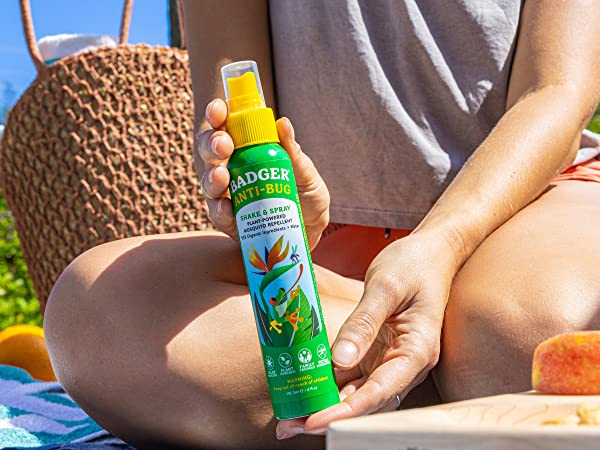
Amazon
Whether you're hiking, biking, or camping, you can keep mosquitoes at bay with this all-natural, certified organic, vegan, and DEET-free bug spray. Badger has been laboratory tested and is effective at repelling mosquitoes thanks to a tried-and-true blend of natural ingredients including citronella, cedarwood, rosemary, and lemongrass. The spray comes in a lightweight, recyclable, and TSA-approved (Transportation Security Administration) aluminum bottle, making it easy to travel with and an environmentally friendly choice. Just don't forget to shake the bottle before you use it—hence the name!
Babyganics Natural Insect Repellent
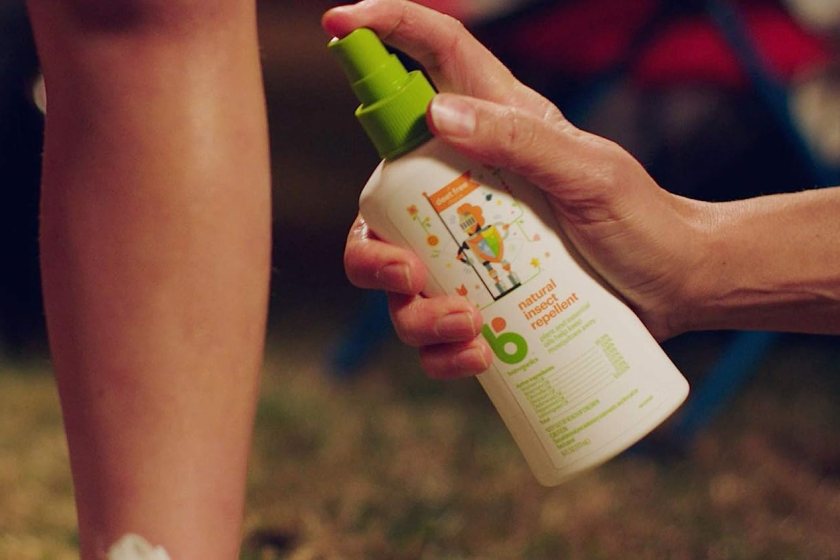
Amazon
Despite the brand name, Babyganics is the perfect go-to natural repellent for the entire family, including members with sensitive skin. It's made from a blend of plant and essential oils—such as citronella, peppermint, rosemary, lemongrass, and geranium—and is also made without parabens, sulfates, synthetic fragrances, or dyes. Use it on your little ones or even the big kids for whatever outdoor activity you have planned.
Quantum Health Buzz Away Extreme Insect Repellent
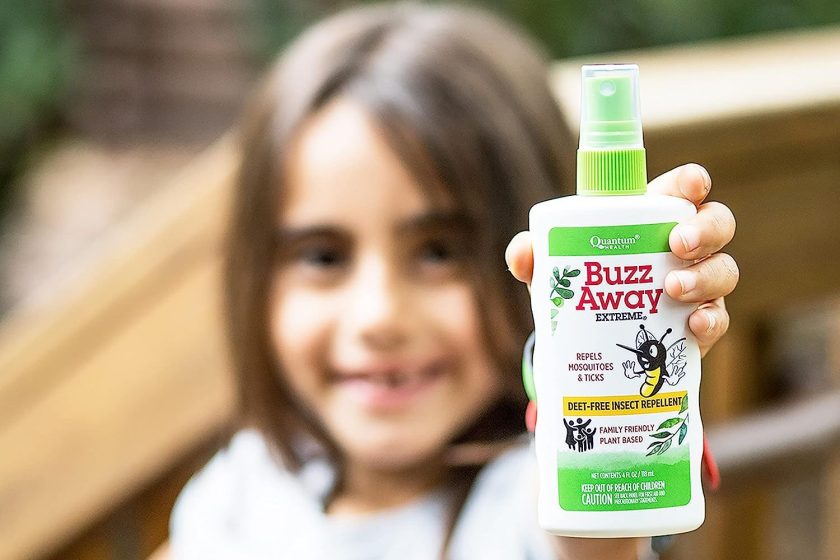
Amazon
This plant-based spray has proved to be effective against mosquitoes and ticks in both lab research and independent field testing. The repellent uses citronella, geranium, lemongrass, peppermint, and cedarwood oils along with aromatic essential oils, plant-based preservatives, and purified water. While the blend of oils can give off a strong scent, it does fade within a few minutes. Overall, this spray is a kid-friendly option and works well without causing any reactions, even on skin that is prone to eczema.
OFF! Botanicals Insect Repellent IV

OFF!
The OFF! brand offers several different options when it comes to insect repellents, but this one is specifically made from plant-based ingredients chemically synthesized from pine oil extract. Not only does it repel mosquitoes—including the ones that may carry West Nile virus—but it is also effective against black flies, gnats, and no-see-ums for up to two hours. This versatile spray won't damage your clothing or gear, and it's unscented—a huge plus for those with sensitive noses.
California Baby Natural Bug Blend Repellent
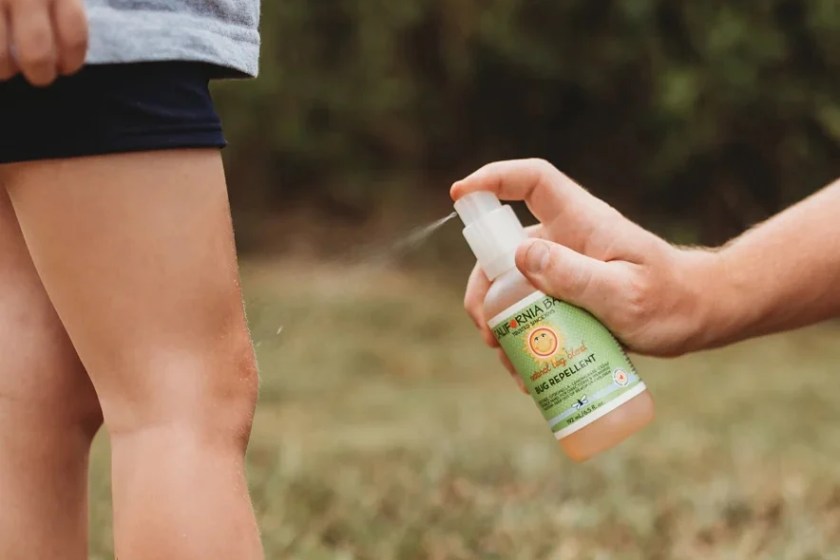
@kaitlinbranter/California Baby
California Baby's bug spray, an award-winning repellent, uses a DEET-free formula consisting of pure essential oils of lemongrass, citronella, and cedar. This spray smells lovely to humans but naturally repels pesky mosquitoes. It is also free of common allergens such as gluten, soy, sesame, oat, dairy, peanuts, and tree nuts. It is also safe to use from head to toe on babies 6 months and up. Not only will it save your kids from carrying unwanted guests, it does double duty soothing existing bug bites and calming irritated skin with calendula and aloe vera.
Wondercide Insect Repellent
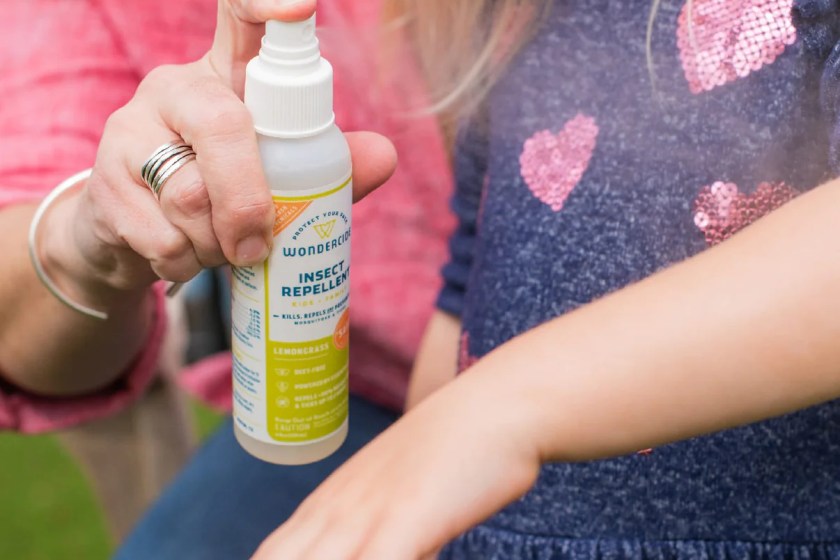
Wondercide
This natural plant-based bug repellent from Wondercide repels 98% of mosquitoes and can also be used to kill and repel gnats, ticks, fleas, no-see-ums, other biting flies, and spiders. Made in the USA, this product is DEET-free and is safe to use on adults, children, and your furry little friends. Wondercide also offers this bug spray in four different scents: cedarwood, lemongrass, peppermint, and rosemary.



